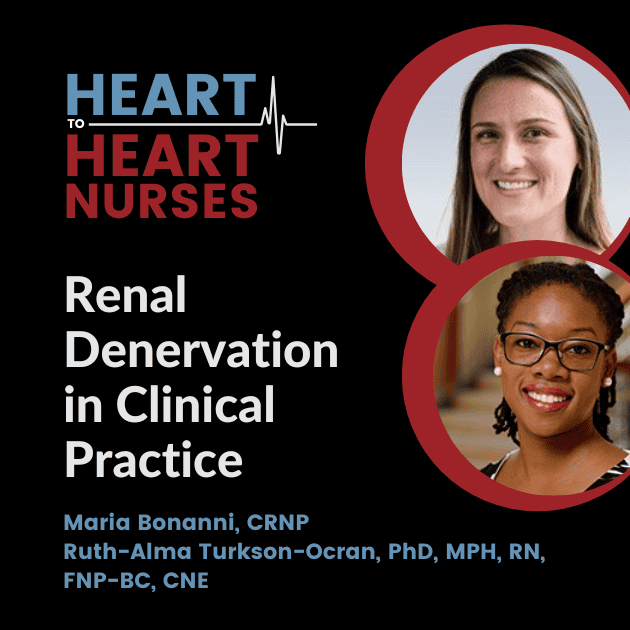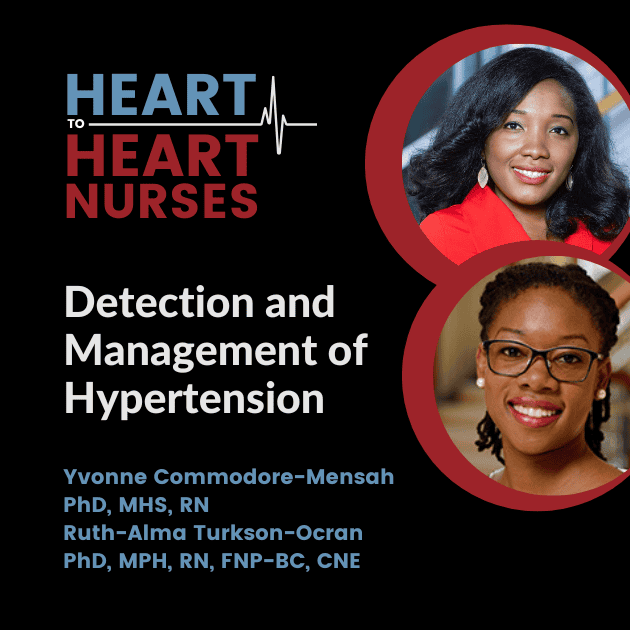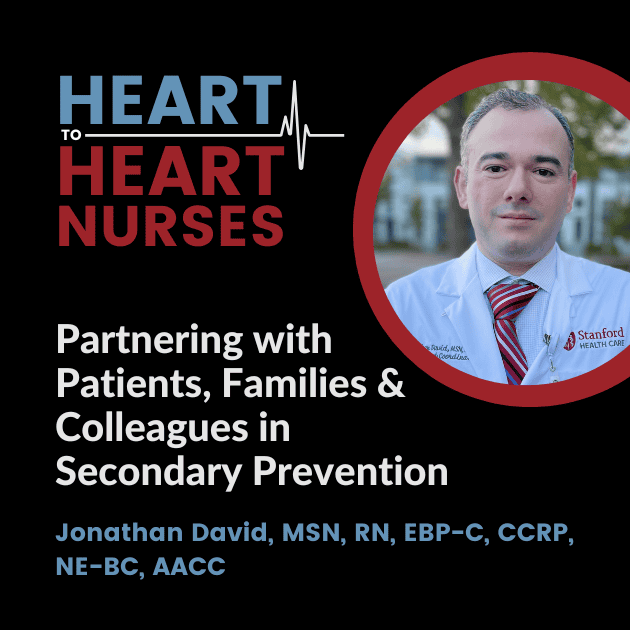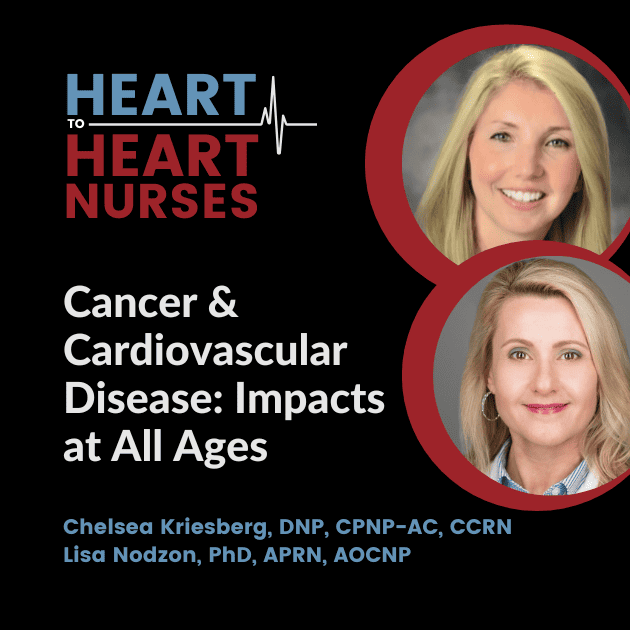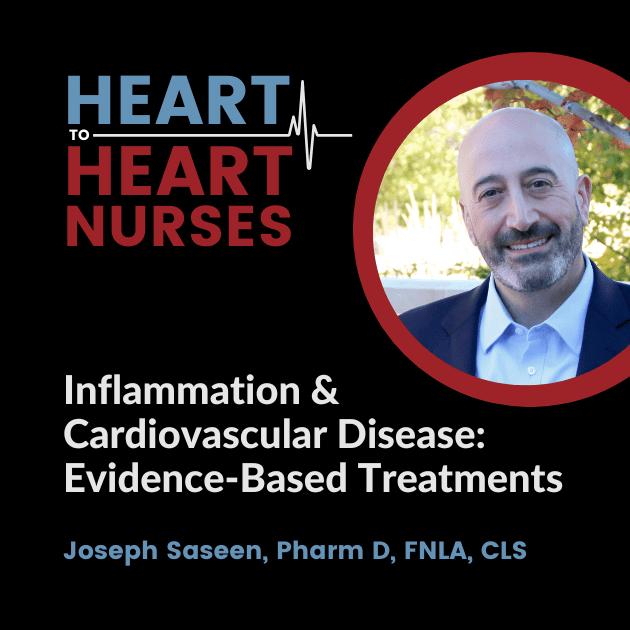Team-based care for patients with heart failures and related comorbidities is an effective management practice, helping support patients in both inpatient settings and beyond. Guest Anita Rich, DNP, RN, CHFN, CDCES, describes how to instill confidence in team members, be an effective change agent, and inspire hope in these complex patients.
Episode Resources
Welcome to Heart to Heart Nurses, brought to you by the Preventive Cardiovascular Nurses Association. PCNA's mission is to promote nurses as leaders in cardiovascular disease prevention and management.
Geralyn Warfield (host): I'd like to welcome our audience today to our podcast episode where we're speaking with Dr. Anita Rich.
Dr. Rich, could you please introduce yourself to our audience?
Anita Rich (guest): Yes, thank you for this opportunity. I'm Anita Rich. I've been a nurse in cardiology for over 40 years. It's very, very dear to my heart, literally. And I'm just very, very excited to be here.
I have two main roles. I am the Heart Failure Coordinator for Emory Johns Creek Hospital, which is affiliated with Emory University Hospital in Atlanta.
I'm also a Professor at the School of Nursing at Emory University, Nell Hodgson Woodruff School of Nursing. So, that’s who I am. I'm also married to David for almost 40 years [00:01:00] and just had my fourth grandchild.
Geralyn Warfield (host): Well, congratulations. What a rich life you have shared with us. And we are so excited to talk to you about things that include our first topic, which is heart failure and best practices for managing comorbidities in those very complex patients that have heart failure.
Anita Rich (guest): Yes. And the thing about it is it's just so many comorbidities. There are just so many things that have such a big impact on heart failure. And how well people do can really be mitigated by the nurse, and the knowledge that the nurse has.
So, I think that one of the main things that I try to do for my patients is I try to make sure that I get all the team members that are available to them. I try to make sure, for example, if they have diabetes, that they are under the care of an endocrinologist and that they're very aware of those numbers and how they need to be managing that comorbidity.
If they're struggling with overweight or obesity, I connect them with our bariatric program at Emory as well.
Also [00:02:00] making sure that they have a primary care physician, including a registered dietitian. At our facility, patients can come back for outpatient visits with registered dietitians as well.
Also, pulling together people that, again, team members, such as diabetic care and education specialists. So, I'm also the diabetes care and education specialist for Emory Johns Creek Hospital. And often, a lot of times, very often, my patients are both diabetic as well as have heart failure. So, I think a big key of that is to get the right team members.
All my patients, I see them in the inpatient setting. So, I want to make sure that my impact goes out the door with them. And by that, I mean I connect them with people so that it's a safe transition. It's a hopeful transition. That they don't have to understand everything I say right now at the bedside to them. But there will be other people outside the hospital that can be there to support them as well. [00:03:00]
Geralyn Warfield (host): I really appreciate the longitudinal. look that you have at each patient in terms of you are responsible for setting them up for success, basically.
Anita Rich (guest): Yes, absolutely.
Geralyn Warfield (host): As they are leaving your facility, going to a hospital or home, whatever that next transition is for them, making sure that they have the information and also the resources that they need.
Because we all know as clinicians, we say a lot of things, and patients. hear a lot of things, but they may not process all of the things at once. So, making sure that they have the strategies in place to make them, have the resources, as I said, in case they have a question a week from now, a month from now, a year from now, they know where to go to find the answers.
Anita Rich (guest): Absolutely. And I have made, I don't know who coined this term, but it's like asking your patient to drink out of a fire hydrant. There's absolutely no way that they can comprehend everything I say. At all.
And so that's another part, too, when we start to think about readmissions [00:04:00] and how often we can be judgmental by saying, “Oh, you know, they're a frequent flyer” or whatever.
Well, go back to that discharge education. Would you have been able to understand and comprehend all of those things at the same time? Not necessarily. So, I think there's a big responsibility for the nurse to prepare them with education, and a lot of written education.
And connections with phone numbers.
And also, even understanding that patients don't understand that they need all these team members. They may say, “Well, my primary care doctor, you know, treats my diabetes.”
And I may say, “Well, how's that working for you?” Especially if I know that their A1C is out of range and so forth. So, there's a lot in the communication that is important and critical to the patient—and their families as well, obviously.
Geralyn Warfield (host): And the other part of this is that you need to have clear communication not just with you and the patient, but with you and those other team members.
Anita Rich (guest): Absolutely.
Geralyn Warfield (host): And I'm wondering if you could speak a little bit to how we can be [00:05:00] better team members as part of this complex web of care that's happening.
Anita Rich (guest): I'm so glad you brought that up because I think that really relates to being the change agent and also relates to being that team member. And one of the speakers earlier today talked about how interprofessional teams are so important and what the essential components are for that. And I want to just speak to that if I could.
And one is that role clarity. That every member has a unique role, whether they are the, wherever they are on the ‘totem pole.’
So, just understanding that the PCT, or nursing assistant—help them to understand the reason why. And understand the purpose for doing the strict eyes and nose and the daily weights, and understanding that their role is pivotal to the next person's decisions for that patient.
I've taught those classes to those staff members to show [00:06:00] them that the information that they gather and document for those patients literally guides the decisions for the next care. And so I feel like having the team members understand everything that they do is so, so important and our care is as strong as our weakest link, if you will.
And so not only those staff members, but also the nurses. And also pulling in the pharmacist to help understand those medications. The physicians as well.
And having that trust and confidence was something else. Being confident in the abilities that you have, knowing what they are, preparing for them and in your role there.
For example, early in my career, I had a physician that asked, I mentioned a concern I had about a patient. And he said, “What do you think?”
And I was a new nurse. And I was really taken aback that he would ask me, he was the attending, he would ask me what I thought. And at that point, I realized, okay, first of all, I need to know my stuff, you know. Second of all, I need to have anticipation of what might be a good [00:07:00] process for them to be managed or some other kind of intervention.
So, I want to have people to be very confident in their roles and in their abilities. But also, for all of us to be committed to the goal that was mentioned today, even with the challenges. And sometimes there are communication challenges, communication barriers between different roles. So, I think that's something that's very important, to help break down some of those barriers.
And also, to overcome personal differences and have those crucial conversations. And let the data speak, let the data argument your course, as opposed to you arguing with another person about a situation. Let the data prove that point. To maintain good relationships, good professional relationships, and honoring everyone's input.
Geralyn Warfield (host): I think that health care often is art as well as science.
Anita Rich (guest): Oh, absolutely.
Geralyn Warfield (host): We all bring to the [00:08:00] table various skills, various knowledge sets. And sometimes, especially in crisis situations, of course, you know, somebody does have to be in charge and be the, you know, decision maker in, you know, in, in those cases.
But oftentimes we have just a hair more time and can communicate with each other and share concerns, share challenges that we're having, share successes that are happening. So best practices.
So, I appreciate the fact that you are empowering people of every job title, and of every job skill set that's working with a patient or their family members or their caregivers, to give them the knowledge that they need to help make that patient's outcomes as successful as we can possibly make them.
Anita Rich (guest): Right. And I do think setting people up for success. So, for example, we just started in the last few months, having inpatient heart failure physicians rounding. So, in preparing for that, I felt it was important to let the nurses understand that the [00:09:00] typical dose, for example, of a diuretic that a hospital medicine service physician might order is not going to be anything compared to what this service is going to be ordered.
The diuretic might not be given as an IV push. It may be given as a drip. Maybe they weren't familiar with that. So, you try to prepare people for things that are coming down the way so that they feel more confident in that. And understanding that there will be some changes as we learn more.
Geralyn Warfield (host): We're going to take a quick break and we will be right back.
Geralyn Warfield (host): We're back with Anita Rich talking about heart failure and team-based care. And Anita, I wonder, we've talked a little bit about different job titles that people have and different jobs that people are trying to accomplish as we're working with patients with heart failure.
And sometimes we don't all feel like we can be change agents, I think you used that term earlier. But we all have a role and a responsibility in that. And I'm hoping you can talk about that just a little bit more with our audience.
Anita Rich (guest): I would be glad to do that. I think one of the main things that I think [00:10:00] about when I think about being a change agent is being that change agent for yourself first. And that is take it upon yourself to stay up to date.
I graduated from nursing school in, I'm not even going to say when. So obviously a lot of things have changed since then. And if I don't take it upon myself to learn what those things are, I'm not being the best nurse that I can be. And I'm not, probably, going to be a safe nurse, actually.
So, I think that it's really important—and I tell this to new nurses. I tell this to nursing students—it’s really important to make that investment in yourself first.
Join an organization. And I'll go ahead and put in a plug for PCNA because this is an organization that the focus is on preventive care. It's on nursing, it's on cardiovascular. All these things that we can learn from.
I also think it's really important, and I highly recommend, that you get involved with a local chapter. For example, go to those meetings, [00:11:00] learn what the guidelines are when they come out. And I think the difference between an organization such as PCNA versus American Heart Association, a specific organization for nurses I really, really appreciate.
But I also think it's very important to know what the new guidelines are. Take it upon yourself. Go on the website if there's no other way for you to find out what they are.
Also, specialize in something. So, for example, get certified in something. I've always been a heart failure nurse, so I became certified as a heart failure nurse. Get involved with those certifications, take it upon yourself, challenge yourself, make the investment in yourself to pay for the courses, to pay for the exam, perhaps get support from your organization to do that, but to know that you have that specialized information for that type of care.
And as I mentioned before, knowing the guidelines, the guideline-directed medication therapies. Yes, I'm not a provider. I don't write the prescriptions, but I do care for [00:12:00] patients. And I do know, based on what the guidelines are, that ideally they should be on this medicine, this medicine, and so forth.
So, when I round with the physicians—and I encourage nurses to do this too—ask questions. Not necessarily in front of the patient but ask questions. You know, “Would this medication be appropriate for this patient?” Or, “As part of the guidelines, would this patient, would there be any reason why this person would not need to be on that?”
You know, more inquisitive versus challenging, obviously. But it really helps also build respect, I think, for the other team members to know that you know what the guidelines are and you're doing what's in the best interest of the patient to ask that question.
It could be a very good reason why they're not on it. But if you want to know and you want to have better understanding, having those conversations, I think, is really important.
Also again, understanding and being confident in your own understanding and your own knowledge, so [00:13:00] that you can care for the patients specifically, obviously.
Also, you can teach the ‘whys’. I did not have a mother that put her finger in my face and said, “Because I told you so.” Thankfully, I did not have that. So, I don't want to be that kind of nurse either when I'm doing patient education. I want them to understand why. Why this is so important?
And I can't explain it to them if I don't understand it myself.
And I think that one of the biggest things that I love about nursing is when you do share information with someone, you can see the fear falling away and the hope coming up that there they will be better. They can get better. There are options for them. There is help available to them/
So, I think knowing your stuff, being certified, knowing what the guidelines are, being able to share and teach the ‘whys,’ provides that hope to patients.
And also know so that you can support other people on your team. I've heard it said that I think it's something like this: “No one can know everything, but everyone can know [00:14:00] something.” And so find out what that something is for you. What are you passionate about? For me, it's heart failure.
And so, for me to know that, not to say I'm the expert, but I am a resource. I am somebody that really understands this, and so I can share that as a resource with younger nurses or with nurses that are less experienced in heart failure.
Heart failure patients are on every unit of the hospital. And they're not necessarily cohorted on a heart failure unit. So, I think it's really important to have a resource for that.
And again, as I mentioned earlier, being the resource for the PCTs and the nursing assistants. And again, as I said, we are, we are strong when every link is strong in that chain of care for the patient.
Geralyn Warfield (host): I am so pleased that you talked about instilling hope because when you get a diagnosis of heart failure, the word ‘fail’ is right in the title. And that can help our patients by what we do, provide them with a path forward towards the [00:15:00] best possible outcomes for them.
We have been talking with Anita Rich about heart failure and being a great team member and helping our patients on the trajectory towards the best life possible.
This is your host, Geralyn Warfield, and we will see you next time.
Thank you for listening to Heart to Heart Nurses. We invite you to visit staging-pcnasite.kinsta.cloud for clinical resources, continuing education, and much more.
Subscribe Today
Don't miss an episode! Listen to the Heart to Heart Nurses podcast on your favorite podcast listening service.







